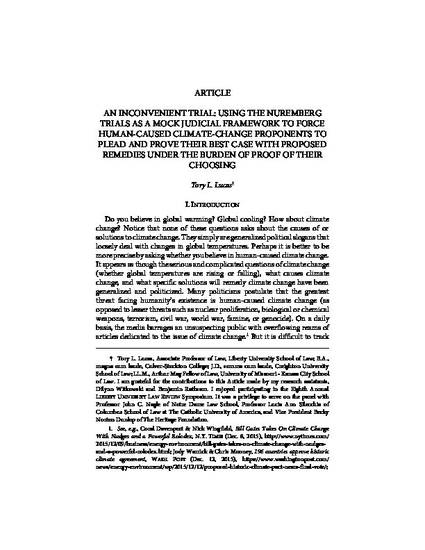
Article
An Inconvenient Trial: Using the Nuremberg Trials as a Mock Judicial Framework to Force Human-Caused Climate-Change Proponents to Plead and Prove Their Best Case with Proposed Remedies under the Burden of Proof of Their Choosing
10 Liberty University Law Review 399
(2016)
Abstract
Do humans control the global thermostat? Should global temperatures remain constant? What are the precise causes of and specific solutions to climate change? The serious and complicated questions of climate change have been generalized and politicized. Many politicians postulate that the greatest threat facing humanity’s existence is human-caused climate change (as opposed to lesser threats such as nuclear proliferation, biological or chemical weapons, terrorism, civil war, world war, famine, or genocide). It is challenging to fully comprehend and decipher the level of scientific confidence on specific claims and proposed remedies on climate change. This Article proposes the use of the judicial framework utilized in the Nuremberg Trials to seek truth and justice while building a historical record on claims of climate change.
Even though the causes of and solutions to climate change are amorphous and complicated, the politicized rhetoric has been ratcheted up against anyone who questions “scientific consensus.” Anyone who expresses doubt about what causes climate change or what remedies will stop climate change is derisively deemed a “climate-change denier.” The use of “denier” is not an accident. After World War II, the Allied Powers claimed that the leaders in Nazi Germany had engaged in unspeakable crimes, including the systematic extermination of millions of Jewish people through the Holocaust. History could have mischaracterized these claims as mere propaganda by the victors, enabling “Holocaust deniers” to challenge the historical record. Ensuring that history could never mischaracterize horrific genocide, the Allies used the judicial process to prove that the Nazis had engaged in crimes against humanity and to create an impenetrable record of the atrocities. The Allies created the International Military Tribunal that led to the famous Nuremberg Trials. These trials were a huge success in bringing Nazi war criminals to justice while ensuring that “Holocaust deniers” forever would be confronted with an impenetrable historical record.
Given the complexity of global climate change and the heated politicization of such a serious issue containing nearly infinitely complex variables, the steady hand of the adversarial judicial process might aid the universal search for truth on climate change. Climate-change proponents allege environmental crimes against humanity, which historically track in terms of international significance with the crimes against humanity at the heart of the Nuremberg Trials. In the Nuremberg tradition, we should establish the Mock International Climate-Change Tribunal for the Trial of Environmental Crimes against Humanity. This mock judicial process will not grant any tribunal actual legal authority or jurisdiction to enforce remedies. The judicial procedures employed, however, will be fully transparent and entirely adversarial and include a charging complaint, answer, full discovery, a mock trial, detailed written judgments, and an appeal. All evidence will be discoverable and accessible in an international clearinghouse, and every testifying witness will be subject to the truth-seeking spotlight of cross-examination.
This Article contends that the best way to seek the truth behind claims of climate change is to force its proponents to plead and prove their best case on what specific conduct contributes to climate change, what impact that conduct has on the global climate, what remedies they seek, and what impact those remedies will have in resolving their claims. A key feature will force climate-change proponents to proclaim openly their level of confidence in their theories by choosing the burden of proof for each contested claim and remedy. If climate-change proponents believe strongly in their case, then they undoubtedly will choose to be held to the high criminal standard of beyond a reasonable doubt. If proponents lack conviction in their theories, then they can ratchet down their burden of proof to clear and convincing evidence or the more-likely-than-not-preponderance-of-evidence standard. Finally, if climate-change proponents have little faith in their theories, they can choose to prove their claims by a mere scintilla of evidence. But I doubt that such trivial evidence would support such lofty claims or be worthy of a trial.
If the framework of seeking justice used in the Nuremberg Trials is utilized in the climate-change context, it will seek truth and create a valuable historical record. Given the judicial process’s expertise in seeking truth and creating a full and transparent record—traits uncommon in the political process—the issues swirling around climate change will be better understood, analyzed, and adjudged. This Article presents a workable solution that could galvanize and unify disparate forces to seek the unfiltered, depoliticized truth on climate change. Let’s put all of the theories and claims made by climate-change proponents to the harsh, truth-seeking spotlight of a mock trial by using the Nuremberg Trials as the model judicial framework. Human-caused climate-change proponents must plead and prove their best case with proposed remedies under the burden of proof of their choosing. Climate-change proponents and “climate-change deniers” alike should come together to carry out this Article’s proposal. Let’s have the trial of the century on climate change. The world will be watching!
Keywords
- climate change,
- global warming,
- global cooling,
- greenhouse gas,
- emissions,
- carbon,
- trial,
- Nuremberg,
- Obama,
- Gore,
- denier,
- mock trial,
- International Climate-Change Tribunal,
- environment,
- crimes against humanity,
- Justice Jackson,
- International Military Tribunal,
- Holocaust,
- IPCC,
- cross examination,
- adversarial,
- politics,
- consensus,
- sunlight
Disciplines
Publication Date
2016
Citation Information
Tory L. Lucas. "An Inconvenient Trial: Using the Nuremberg Trials as a Mock Judicial Framework to Force Human-Caused Climate-Change Proponents to Plead and Prove Their Best Case with Proposed Remedies under the Burden of Proof of Their Choosing" 10 Liberty University Law Review 399 (2016) Available at: http://works.bepress.com/tory_lucas/14/
